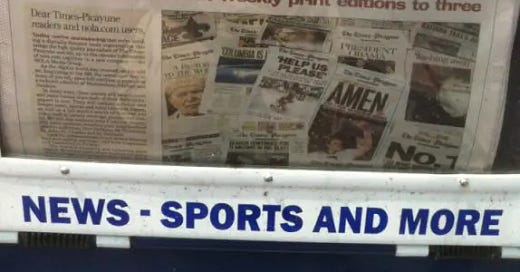The daily newspaper has always been a fixture in my house. For as long as I can remember, my family had the Charlotte Observer delivered to our house. Some of my earliest memories are sitting at the kitchen table eating breakfast and reading Scott Fowler’s weekly Panthers column. I even remember going to my grandpa’s office (where he was the editor of the Fayetteville Observer for many years) and watching the reporters work on the copy desk. Two years ago, my parents decided to stop having the paper delivered because they could read all the news online which was more convenient and timely.
The death of old-fashioned “newspaper journalism” and the shift to online media and social media is a movement of significance that I am fascinated with. Today, news is received faster and more conveniently. However, this shift away from “newspaper journalism” comes with a cost.
The shift to online media has resulted in a lack of reliability and credibility. Some media companies are desperate to stay alive and need revenue, so they resort to catchy headlines and clickbait. With others, there may be a perceived rush to be the first to report, which may lead to inaccuracies due to a lack of fact checking. Other news companies may be biased to attract a certain audience and only present one side of the story.
Additionally, the shift away from “newspaper journalism” and towards online media has lowered the bar for publication. This change has harmed the overall integrity of the media because many people go online and spread information that is false and hateful. Furthermore, social media acts as an accelerator for unreliable information, particularly where people look to it as a news source not realizing that the source and contents of the post may be unreliable.
Local print media was reliable by comparison. Articles were fact checked multiple times, editing processes were longer, and stories were well-researched. Print newspapers helped create, inform, and connect a local community without the distractions of clickbait.
Despite the drawbacks of online media, it is clear that it is here to stay as we are in the digital age. But that doesn’t mean we have to accept how things currently are. I believe we can and should take some steps to proactively combat this issue. One idea is to have schools teach media literacy class. These classes would teach kids to be curious about their sources and navigate social media better.
This summer, I interned for a local online media company, and I was excited to find that there are media outlets more concerned with reliability, fact checking, and investigative reporting than they are about a paywall. I think supporting media outlets like the one I interned with is vital for the future of journalism, which serves as a watchdog to protect us all.




